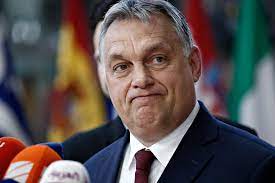Blackmail, bluff or brinkmanship? Hungary’s Viktor Orban rattles EU unity

Brussels: Was Viktor Orban just bullying his European colleagues to kick loose a few billion euros in EU funding, or would he really blow apart the bloc’s united stance against Russia’s invasion of Ukraine?
Across two days of debate in Brussels, the Hungarian Premier adopted an uncompromising tone in public, but behind closed doors the decision-making process played out within the structure of European Union rules.
“He prefers unity. He doesn’t want to block everything. He’s more reasonable than the image he portrays,” a source from one of the member state summit delegations said.
“Then he handles the domestic front, he says: ‘I stood tall’, ‘I imposed my veto’.”
The final EU summit of 2023 was to have been a historic show of unity and resolve in the face of Moscow’s aggression and 22-month-old all-out invasion of Ukraine.
Kyiv was to receive a four-year macroeconomic support package of €50 billion (S$72.6 billion) – a lifeline for the war-ravaged government – and an invitation to begin formal EU membership talks.
Mr Orban, who is already in a fight with Brussels over billions of euros in frozen EU funding to develop his own economy and is the EU leader closest to Mr Vladimir Putin’s Moscow, appeared in no mood to play ball.
To open EU accession talks with Ukraine would be, he declared, “a completely senseless, irrational and incorrect decision” which he could not permit – until, a few hours later – he did.
Mr Orban could have vetoed the EU enlargement plan, but instead he agreed to discreetly leave the room to allow the remaining 26 leaders to adopt the historic measure by consensus.
There was astonishment in the corridors of the Brussels summit venue that he had blinked so early. Leaders had joked that they had packed several clean shirts in case the debate went into next week.
And then there was stupefaction when, after missing a chance to veto Ukraine’s EU membership ambitions, the authoritarian blocked the adoption of an EU budget (MFF) update containing the €50 billion.
“Summary of the nightshift: veto for the extra money to Ukraine, veto for the MFF review. We will come back to the issue next year… after proper preparation,” Mr Orban declared, in a social media post.
In Brussels media interviews, he insisted that Hungary would never be so crude as to link support for Ukraine to the €21 billion in EU funds that Brussels is withholding over concerns about the rule of law in Hungary. “That’s not our style,” he told reporters.
But on Dec 15 morning, on Hungarian state radio, he was boasting that his brinkmanship had already won €10 million back on the eve of the summit and would serve him well as he sought the rest.
For international affairs analyst Francois Heisbourg, who reflected the views of many at the summit, Mr Orban’s behaviour adds up to a fairly consistent pattern of blackmail.
“He wanted to keep milking the Brussels cow,” said Professor Heisbourg, a fellow of the International Institute for Strategic Studies (IISS) in London.
“Because he got into difficulty with all the cases concerning the rule of law, he now does it by threatening to block the big decisions,” he said.
Twice Hungary’s prime minister, first from 1998 to 2002 and now since 2010, Mr Orban is the most experienced leader on the European Council, but he is also a known quantity to his peers.
“He knows the rules of the game. He also knows how to formulate his messages in such a way that he always has several exit routes,” said one European diplomat at the summit.
But on Dec 14, he folded on Ukraine’s accession, the diplomat added.
In the same way, the diplomat said, Mr Orban has never stood in the way of European sanctions against Russia “despite what people say about his proximity to Vladimir Putin”.
Another European official said: “Viktor Orban knows when he can get something and when he risks finding himself in a corner.”
For Hungarian observers like Daniel Deak, researcher at the pro-government Hungarian Institute of the 21st Century, this is a little unfair. Hungary, he argues, is “not alone” on Ukraine.
Several major countries approve of his position and hide behind his outspoken tactics, he argued, “without daring to say it openly due to pressure from the United States and the media”.





